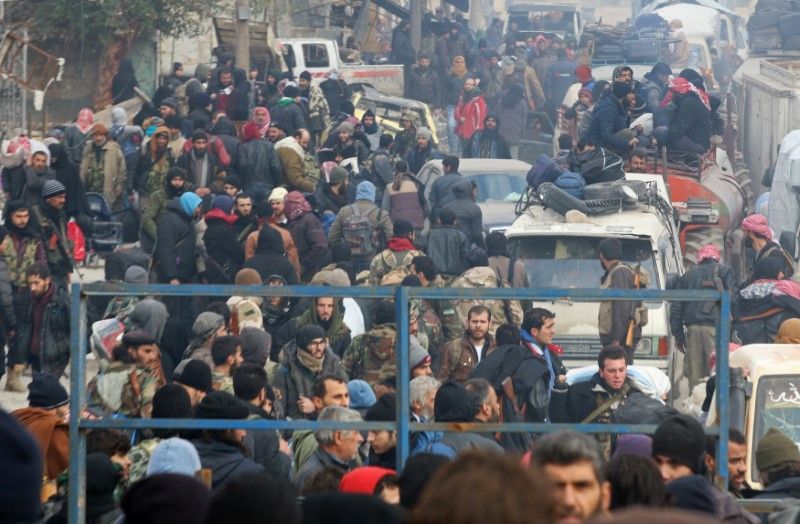
The fall of Aleppo on December 14 signifies a crucial shift in the long and bitter war between the Russian-backed forces of President Bashar al-Assad, and the embattled and fragmented Syrian opposition. After months of relentless bombardment by Russian planes, and fierce urban warfare, East Aleppo succumbed—or was "liberated," depending on one's political views.
But peace is not immediately imminent. Assad himself said earlier this month that the battle for Aleppo "won't mean the end of the war in Syria, but it will be a huge step toward this end." The focus will just shift to another region of Syria where the opposition is still strong, or to Idlib, where many of the civilians from East Aleppo, will be shifted.
RELATED: An Aleppo resident bids farewell to his hometown
For the civilians who endured months of cruel bombardment that forced them to live in their cellars in darkness, without electricity or food, there is not yet solace. Thursday, the UN's Human Rights Office said that, "We received quite credible reports that hundreds of men had gone missing after they crossed into government-controlled areas." The most vulnerable are young men of fighting age. "We want to leave, but we are not sure how, or when, or even what to do to get out," Monzer, a student, wrote via Facebook messaging. "But I know that we have to get out—and fast."
Recalling the fall of the Old City of Homs in 2014, Faysal Itani from the Atlantic Council's Rafik Hariri Center recently wrote in the New York Times that in the aftermath of the fall of the town, young men were forced in conscription of Assad's army—the very army that had killed members of their family. Others were forced to re-populate to other areas.
"Residents were eventually allowed to leave to other opposition areas carrying a single bag each. (Fighters could take one weapon.) Displacing or detaining populations has become business as usual in areas retaken by the regime." Itani referred to this as "The Green Bus Strategy."
The first green buses arrived Thursday to transport the civilians out of occupation-controlled East Aleppo. The night before, there were reports of heavy shelling throughout East Aleppo, according to a spokesperson for The White Helmets, the Syrian Civil Defense, the city's first responders.
Left behind is a broken and mangled city.
Fiercer Fighting to Come?
"Aleppo is now a synonym for hell," U.N. secretary-general Ban Ki-moon told reporters in New York on Friday. However, the U.N. chief has been criticized for not doing more earlier that might have stopped the bloodshed which has so far killed more than 300,000 people and triggered a refugee crisis that has left more people displaced since the aftermath of World War II.
What is worrying is that Aleppo might not be the worse scenario of the war. Assad's goal is to reconquer the entire country. That means fiercer battles will have to take place in Idlib—where many of the displaced people from East Aleppo are heading—and other opposition strongholds in northern Syria. There is also the question of conquering the Islamic State militant group, which has recently re-taken Palmyra.
More important is that the Syrian war—which started out as a peaceful uprising in 2011 and quickly turned to an armed conflict, then civil war—has become a proxy war involving all the regional players. While it would be simplistic to say it is a Sunni-versus-Shia conflict, the involvement of Iran on the Assad side has alarmed the Sunni regimes, particularly in the Gulf. Iran is a dangerous regional threat, and continues to be an enemy.
As for the political future? Staffa de Mistura, the U.N.'s special envoy, flew back to Geneva from U.N. Headquarters in New York on December 14, as Russia, Turkey and the United States continued to negotiate over Syria's fate. De Mistura, an Italian-Swedish diplomat who has worked in conflict zones for three decades, says he is still determined to push ahead for a political solution.
But the true driver now is Assad—who has essentially, for all practical purposes, won the war.
Read more at Newsweek.com:
— Kerry blames 'massacre' in Aleppo on Assad's government
— Aleppo residents express fears of death
— Timeline: The battle for Aleppo
Uncommon Knowledge
Newsweek is committed to challenging conventional wisdom and finding connections in the search for common ground.
Newsweek is committed to challenging conventional wisdom and finding connections in the search for common ground.
About the writer
Award-winning author and journalist Janine di Giovanni has been covering global conflict since the 1980s, and is considered one of ... Read more
To read how Newsweek uses AI as a newsroom tool, Click here.








